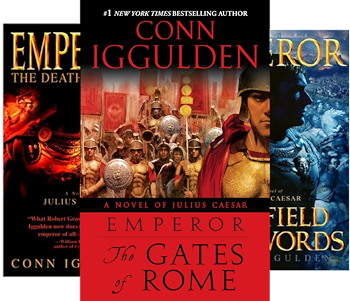
![]() The Death of Kings by Conn Iggulden
The Death of Kings by Conn Iggulden
Julius is a young soldier. He fights in northern Africa, but he is not in command. Still, he is very well trained, is charismatic and trusts his instincts, and he is beginning to learn what it means to command and why he loves everything Rome stands for. He is confident, idealistic, and capable, a potent combination that leads to many victories. By the end of the novel, he will deal with Spartacus and Sulla, pirates, and senators who wish him ill. He will taste true power, love, and loss.
Published in 2004, Conn Iggulden’s The Death of Kings, the second of four entries in the EMPEROR series (after The Gates of Rome), is a work of historical fiction, though it’s just as much a work of action/adventure. To some extent, it’s not SFF at all, except for one character with a mystical power to heal others. Still, there’s so much here that would have appealed to me when I was in middle and high school, reading David Eddings and Robert Jordan, that it seems worth reviewing here at FanLit.
Julius and his best friend and rival, Marcus, are talented soldiers. Marcus, actually, is an exemplary swordsman. Though they are separated here, both have a knack for getting into battles, fistfights, and sword fights. Both excel at taking men who have given up and turning them into dangerous soldiers. Every now and then, they wade into political intrigues that require them to confront dictatorship, its merits, and whether it is a threat to Rome. Women find both of them fascinating. Sometimes there is gambling, too. They are capable and proud, sometimes perhaps even arrogant, but they have each other’s back.
Some critical readers will complain than the history here is sometimes a bit hit or miss. To be honest, I only knew because Iggulden explains in a straightforward manner after the novel what he has changed, and why. Readers who come to this novel with a stronger command of the history that underpins the story may not be as patient with these discrepancies as I. Still, it says something about fiction that its demand for narrative structures and thematic arcs is so difficult to reconcile with history. At the end of the day, Iggulden seems to have sacrificed history for the sake of his novel, while also undermining the integrity of his novel in order to capture as much of Caesar’s career as he could. I found it interesting to consider that Caesar’s career was so impressive that it perhaps could be captured in a novel. To be honest, in these moments, I find Iggulden’s honesty more interesting than the “based on a true story” that seems enough to make blockbuster biopics worthy of “Oscar consideration.”
Ultimately, readers who want the true history might do well to read the non-fiction works that Iggulden recommends at the end of this novel. The Death of Kings is first and foremost a fun read about fights, power, and intrigue. Though long (over 500 pages), I’d certainly recommend it to readers who are looking for something to read on the beach. There’s just enough history that it feels instructive, even if we all really came here for drawn swords and political intrigue.




This reminds me. I want to read Addie LaRue.
We’re in total agreement David!
I felt just the same. The prose and character work was excellent. The larger story was unsatisfying, especially compared to…
Hmmm. I think I'll pass.
COMMENT Was I hinting that? I wasn't aware of it. But now that you mention it.... 🤔